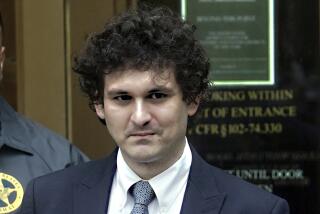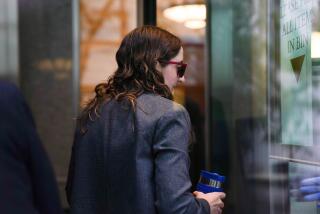Malaysia Seeks Trader After Barings Bank Failure : Finance: Firm’s chairman sees possible conspiracy. U.S., British officials call for tighter rules on derivatives.
Police in Malaysia were searching Monday for the 28-year-old trader whose huge unauthorized stock dealings brought down Britain’s oldest investment bank, as U.S. and British officials called for tighter regulation of derivatives, the complex securities that have been linked to a string of financial upheavals.
Financial markets in the United States and Europe largely shrugged off Sunday’s collapse of Barings, and damage appeared unlikely to spread much beyond the firm itself.
Still, the sudden failure of the 233-year-old firm that had helped finance the Napoleonic Wars and the Louisiana Purchase shocked the global financial community and raised questions as to how Barings’ fortunes could have gone so bad so fast.
The firm’s chairman, Peter Baring, told a London newspaper Monday that he believes there may have been a conspiracy to destroy the company. He described a scenario in which trader Nicholas Leeson might have deliberately built up a disastrous trading position so that an unknown associate could profit from the firm’s collapse.
Whatever his motivation, the Singapore-based Leeson’s dealings in stock-market futures contracts on the Singapore and Osaka exchanges amounted to a massive bet that the Nikkei 225, a Japanese stock index, would rise--a bet that went horribly wrong, as the index slipped nearly 15% in the last two months.
With Barings’ losses still unquantified but estimated to be at least $800 million, the Nikkei dropped 4% Monday to a 15-month low. However, the market recovered in early trading today.
By all accounts, Leeson is no glamour boy, but a bulky, balding figure whose family lives in public housing in the north London suburb of Watford, a byword in Britain for drabness.
Colleagues call him confident, even cocky. His family defends him as a humble youth who made good in the helter-skelter world of Singapore money markets.
“Before this thing happened, we thought he was very brilliant, the most confident trader around town,” a rival dealer said in Singapore. “He seems to be able to move markets. Every day, we would monitor what he’s doing.”
Derivatives--complex securities whose values are derived from stocks, bonds, commodities or market indexes--have come under scrutiny because of a string of financial upheavals. Orange County filed for bankruptcy in December after its former treasurer’s trading in derivatives led to losses of $1.7 billion.
Some experts Monday cautioned against restrictions that would hobble such trading, arguing that derivatives, properly used, are an important tool in managing risk.
“Look, it’s Colonel Mustard with a candlestick in the solarium. Are you going to blame the candlestick for that one?” said Robert Brusca, chief economist for Nikko Securities International in New York.
U.S. and German bond markets rallied Monday, as investors fled to the safety of government-backed securities.
In London, shares reversed big opening losses to end only a bit lower. The Dow Jones industrial average shed 23.17 points Monday to close at 3,988.57, but observers said there was no apparent link to the Barings debacle.
“We believe no financial institution in the United States, at least so far, has significant exposure to Barings,” a senior Clinton Administration official said Monday.
“In many ways it’s almost a source of comfort that there can be a failure of a well-known institution without causing serious havoc,” said Jon Macaskill, a New York-based derivatives market analyst.
Nonetheless, there was profound consternation in Britain that a “rogue trader” could single-handedly scuttle an institution founded in 1762 with long ties to British royalty.
The failure prompted Chancellor of the Exchequer Kenneth Clarke to announce a sweeping review of the British banking system.
In the United States, Rep. Edward Markey (D-Mass.) renewed his call for tougher derivatives regulation.
Nicholas Horsley, co-manager of Warburg, Pincus International Equity Fund in New York, said of the collapse: “The impact in a monetary sense will be minimal, but improved regulation of derivatives will be Barings’ legacy.”
The details of Leeson’s trades were still being pieced together Monday, but Bank of England Gov. Eddie George said Leeson’s job was to exploit tiny price differences between stock exchanges in Tokyo, Osaka and Singapore. Such dealing, known as arbitrage, is safe and profitable as long as a trader matches buy and sell orders.
But a few weeks ago, Leeson started to flout this rule by building up big speculative positions, George told reporters. By the time Barings managers realized something was wrong late last week, Leeson had bought Japanese stock index futures--paper promises to buy a basket of shares--worth $7 billion, in a wild bet that prices would rise and create vast profits.
As Leeson’s risky dealings reverberated in markets around the globe Monday, his family stood squarely by him.
“If you knew Nick like we do, you know he couldn’t have done anything wrong,” the Daily Mirror quoted his sister as saying. “Nick has worked hard for what he’s got, and he deserves it all.”
Leeson’s golden touch netted him a $316,500 annual salary. Market rumors put his 1994 bonus at more than $1.4 million and perhaps as high as $4.1 million.
Times staff writers Tom Petruno and James F. Peltz and wire services contributed to this report.
* LIMITED DAMAGE: A Barings-like collapse is seen as unlikely in the U.S. D1
More to Read
Inside the business of entertainment
The Wide Shot brings you news, analysis and insights on everything from streaming wars to production — and what it all means for the future.
You may occasionally receive promotional content from the Los Angeles Times.










